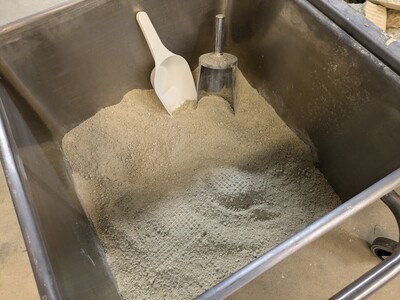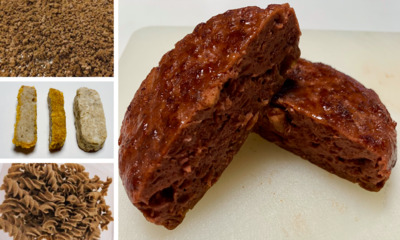Could rapeseed be the next vegan protein?

Researchers at the Fraunhofer Center for Chemical-Biotechnological Processes CBP in Leuna, Germany, have now shown that previously rarely used rapeseed proteins can also be a valuable source of protein alternatives.
Using the EthaNa (ethanolic native extraction) process, they can not only extract high-quality rapeseed oil from rapeseed but also a protein-rich rapeseed kernel concentrate, which can be processed into burger patties and pasta or used as a nutritious feed in poultry fattening.
Rapeseed proteins are similar in composition to milk proteins and are therefore well suited as a plant protein source for both food and animal feed.
In addition to the oil, which makes up around 40% of the ingredients, some 20% of the ingredients in rapeseed come from the sought-after proteins. However, they have not yet been used in food products.
The reason for this is that the structure of the proteins is altered during the conventional hot pressing of rapeseed — the proteins denature. The resulting rapeseed meal also contains fibres and bitter substances from the rapeseed hulls. This impairs their compatibility as animal feed, which is why soy extraction meal is usually added to the feed mixtures.
However, for two years, the pilot plant in operation at the Fraunhofer Center for Chemical-Biotechnological Processes CBP has been gently breaking down de-hulled rapeseed kernels and fractionates them using ethanol as a sustainable solvent. Due to the mild process conditions in the EthaNa plant — a maximum temperature of 70°C and normal ambient pressure — the structure of the rapeseed proteins is hardly changed during processing, meaning that they can be used in a variety of ways.
“Due to the poor solubility of rapeseed oil in ethanol, the oil is displaced from the seeds so that it is directly available as free oil and does not have to be extracted from the solvent at high temperatures,” explained Dr Robert Hartmann, head of the Biomass Fractionation Group at Fraunhofer CBP.
Another advantage of the process is that fatty acids and molecules containing phosphorus, which would impair the quality of the oil, dissolve well in ethanol. The oil obtained therefore achieves pre-refining quality without any further processing steps.
A separate de-hulling system is also installed upstream of the extraction process to separate the oil- and protein-rich kernels from the hulls. This prevents fibres and some of the bitter substances that reduce the quality of conventional rapeseed meal from entering the EthaNa plant and therefore the protein-rich concentrate.
Since commissioning, the EthaNa process has been continuously optimised. The result: in addition to the hull fraction, the oil and the ethanolic extract, a protein-rich rapeseed concentrate remains, which is characterised by a high protein content of over 50% and a low residual oil content of less than 5%.

Rapeseed used as a suitable vegan protein alternative
Due to its high protein content and composition, the rapeseed concentrate from the EthaNa process is suitable for use in protein-rich food products, as recently demonstrated in the EU-funded Like-A-Pro project.
The project consortium examined a total of seven alternative protein sources for their suitability as fish stick or minced meat substitute, for the production of fresh pasta or burger patties, and evaluated the water absorption capacity and emulsion stability as well as sensory parameters such as taste and texture.
The rapeseed kernel concentrate worked well as both as a pasta ingredient and as a burger patty.

“It formed stable emulsions in combination with other ingredients, and the patties impressed with their good consistency, pleasant bite and good mouthfeel,” Hartmann said.
Furthermore, analyses showed a balanced amino acid composition that is beneficial for the human organism. The proportion of essential amino acids is not only higher compared to conventional rapeseed meal, but also in comparison to soy protein.
Using rapeseed kernel concentrate for animal feed
Rapeseed kernel concentrate is also suitable for use as animal feed due to its high content of essential amino acids. And with an optimised protein content of over 50%, rapeseed kernel concentrate reaches the level of soy extraction meal, while conventional rapeseed extraction meal contains just under 40% protein.
The suitability of rapeseed kernel concentrate for animal feed has now been confirmed in the ‘NAPF — new high-protein rapeseed feed’ project, which is funded by the German Federal Ministry of Food and Agriculture. For this, some 40 kg of rapeseed concentrate was produced and dried by researchers at Fraunhofer CBP, and made available to the project partners for feeding trials.
In the feeding trials at the University of Hohenheim, chicks for poultry fattening with feed made from rapeseed kernel concentrate gained a good amount of weight: from 43 g to 1000 g within 21 days.
In the studies conducted by the University of Hohenheim, rapeseed kernel concentrate actually showed better protein digestibility than rapeseed meal. If the researchers also added the enzyme phytase, the protein digestibility of the rapeseed kernel concentrate feed was further increased.
“The enzyme breaks down phytic acids and releases phosphates, which become bioavailable and subsequently improve protein absorption in the organism,” Hartmann said.
Holistic use of rapeseed for enhanced sustainability and profitability
Thanks to its holistic approach, the EthaNa process enables the complete utilisation of rapeseed and produces four value-adding fractions.
In addition to the main product — a high-quality rapeseed oil in pre-refined quality, and the protein-rich rapeseed kernel concentrate suitable for human and animal nutrition — it provides rapeseed hulls that can be used as insulation material, for example.
In addition, the material utilisation of the components dissolved in the extract — such as glucosinolates, sinapinic acid and phospholipids — increases the economic efficiency of the approach.
The ingredients can be used, for example, as plant protection products, in food supplements or in the cosmetics industry. The innovative EthaNa process therefore helps to increase the material value of domestic rapeseed, establish a more sustainable, plant-based and healthy food system based on regional resources, and reduce imports from overseas, thus lowering greenhouse gas emissions.
Does cultured beef have fewer allergens?
A recent food safety study compared the potential allergen hazards in cultured beef cells with a...
What is permissible indulgence, and what does it mean for us in 2026?
Food scientists, formulators and food manufacturers are being asked to redefine indulgent food...
Beany flavour study to enhance the appeal of soy-based foods
A scientific study at the University of Missouri is exploring novel ways to improve the flavour...











